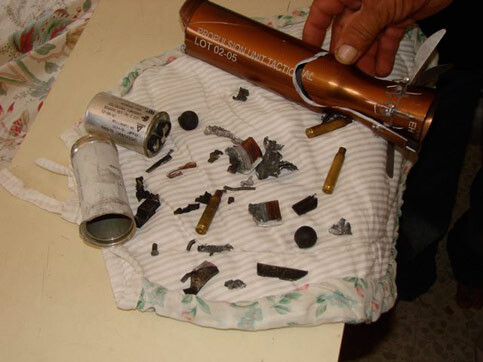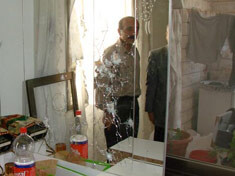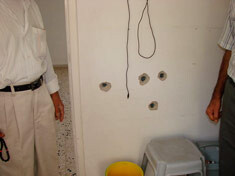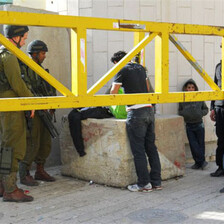
Spent ammunition found inside Fedaa Bolos’ apartment complex.
Since 2003, a health and human rights project developed by members of Jewish Voice for Peace has organized yearly delegations to Israel and Palestine, joining with partners such as Physicians for Human Rights-Israel and Palestinian Medical Relief Society. We document conditions on the ground, bring our stories home, and work on moving the political conversation towards a change in US policy. We focus on issues related to the occupation, its impact on the civilian populations, and the consequences of Israeli incursions, restrictions of movement, and collective punishment. In mid-October 2007 our delegation visited an apartment in Nablus that was the site of an attack by Israeli soldiers days earlier. While we were aware that there are almost nightly Israeli incursions into Nablus, the reality was still jarring and painfully surreal. We walked past a dusty cement-mixer, through a gate and down cracked stone steps to reach the entry to the top floor of a five-story white stone house, built into the hilly landscape in the neighborhood of Ras al-Ein. Potted plants, shattered tiles, and glass were strewn along the path. Men lumbered by, cigarettes in hand, carrying panes to repair fractured windows and the air echoed with the sounds of hammering and electric machinery.
The delegates were ushered into one apartment after another, richly upholstered living room furniture, formal dining room tables, long white draperies, decorative wooden head boards, posters in a child’s room, a blinking TV, now all splattered with bullet holes. The curtains were shredded and burned by gunfire, walls, floors, and ceilings fissured and pock-marked in every direction. In one apartment we were shown a neat pile of rocket parts, bullet casings, mortar shells, and empty flares, the English lettering clearly visible: “White Star Parachute.” Later, a quick check on an internet weapons reference guide revealed that these flares as well as other munitions in the pile were made in the US. There was a sense of grim determination and horror in the faces of the people who belong to this place and everywhere, wide-eyed, terrified, crying children. One teenage boy played on his computer, seemingly oblivious to the destruction around him, American pop music drifting through the open rooms. On the first floor, we were told that a 70-year-old man had been shot and killed when he opened his door for the Israeli soldiers.
In one apartment we were approached by Fedaa Bolos, an intense young woman holding her crying child and clearly wanting to talk. She asked us to describe the terrifying reality of her life to people “in America. They don’t know what we are living here.” She showed us her daughter’s tiny white sweater, shot through with bullet holes and the child’s bed, also riddled with bullets. Fedaa’s husband, Nomair Isbaih, hovered nearby. Later, I met Fedaa sitting with her child at the Nablus Child Rehabilitation Center, run by the Palestinian Medical Relief Society, waiting to see the psychiatrist on our delegation.
An attractive woman with delicate features and a burning sense of indignation, Fedaa was trying to comfort her anxious two-and-a-half- year-old daughter Lara. Gradually we started to talk about trauma, recovery, and the recent events that radically changed her life. I learned that Fedaa is 28 years old and a graduate of An-Najah University in Nablus. Because she has been unable to find work, she stays at home to care for her daughter, reading and watching TV for distraction. “There is no place to go or to take my child to play.” Nomair is now 30 years old and a production manager in his father’s industrial engineering company.


Fedaa recounted that three days ago her husband woke her at 1:15 am and told her, “ ‘There’s Jewish in our area and I am afraid about Lara alone in her room. Go to her room.’ I said, ‘Nomair, I want to sleep.’ He come back angry and said, ‘Fedaa, wake up.’ Suddenly they shoot at us. I get out and go quickly to Lara’s room. They shoot us again in Lara’s room. Nomair started shouting at them, ‘Go! What do you want? Why do you shoot us? There is a baby here.’ The soldier was standing in front of the window, maybe one meter from us. He said to Nomair, ‘Go, I will shoot you now.’ Then Nomair carries me and Lara to our room, seconds between Nomair and death. This is a miracle, I was shaking and I felt my soul go and Nomair hit me on my face and Lara is not crying, not speaking, just shaking.”
The family ran from room to room as bullets, glass, and rocks rained into their apartment. They hid behind furniture for hours until they were found and removed by the soldiers. Fedaa described how the Israeli military occupied their apartment for a day-and-a-half and trashed their belongings.
Now, she waits in a crowded clinic with her child, unclear how to cope with her own incessant shaking, her inability to go to the bathroom at night alone, her husband’s anger with his wife’s paralysis in the face of danger and his own impotence in front of soldiers. Her daughter clings fearfully to her and has started to wet her bed at night. Fedaa struggles with feelings of aggression and anger and is having difficulties sleeping. She talks of the soldiers confronting Nomair, forcing him to strip to his underwear, and “tying his hands so bad, the blood cannot move in his fingers.” She adamantly denies that anyone was involved in shooting at the Israeli soldiers. Weeks later we exchanged emails and she said, “We are still tired and still afraid to move in our home after 8 pm. I don’t know how to explain my feeling, but I think we have a bad time now.” She desperately wants to move to a safe place, “where there are no Jewish guns,” but her permit to leave has been repeatedly denied. She has never met an Israeli who is not a soldier.
Reports by the BBC and the Israeli daily Haaretz noted that an Israeli raid into Nablus killed “one Palestinian civilian and one militant.” The Israeli military expressed regret but did not assume responsibility for the death of the elderly man. Interestingly, B’Tselem, the Israeli Information Center for Human Rights in the Occupied Territories, confirmed what we had been told and added additional details regarding the shooting of the old man, the soldiers’ delay in calling an ambulance, and the rounding up and temporary detention of a number of the men in the apartment.
For me, there is so much that is truly obscene in this description, both in its particulars and as an example of daily occurrences in the occupied territories. Israelis have a right to demand security, but I wonder what is happening in the mind of an Israeli soldier when he threatens to shoot an unarmed Palestinian man clutching his wife and child in his own home, or uses another as a human shield to move from apartment to apartment, or shoots an elderly man in the doorway of his apartment? How do repeated acts of collective punishment and humiliating and terrorizing civilians possibly contribute to Israeli security? Think of the tens of thousands of Fedaas whose lives are constricted and traumatized by these experiences. Think of the children who have never met an Israeli who did not carry a gun. Look at what we know and what we choose not to see. Consider our media, where the suffering of the innocents in the Israeli town of Sderot periodically bombarded by homemade rockets from Gaza, is squarely in the public eye, while the innocents in the city of Nablus under frequent attack by a heavily-armed military, stand invisible and unheard.
Alice Rothchild is an author and co-chair of Jewish Voice for Peace, Boston. This article is an excerpt from an updated version of her book, Broken Promises, Broken Dreams: Stories of Jewish and Palestinian Trauma and Resilience to be republished in 2009.
All images by Howard Lenow.



